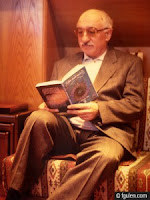One might think that there is an unambiguous relationship between science and literature. Yet to date nobody has made a significant attempt to reveal the link between the two. While numerous studies have attempted to explain the role of science and literature in our lives, far too little attention has been paid to the impact they may have on each other.
 |
| Fethullah Gulen |
One might assume that when science reaches unprecedented heights, people will leave behind all the values, and mastery of rhetoric will become obsolete. Indeed, sometimes, when the topic of discussion goes beyond the scope of a spoken or written language, it is quite natural that gestures, facial expressions, sounds and other means of expression take the place of words and sentences. Yet they have never been able to completely replace the speech and writing. How would then people exchange and persuade each other to accept new ideas? Gulen suggests that people will never abandon literature, as they need it to penetrate into the minds and win the hearts by its charm and grace. He thinks that, clothed only in a written form, literature is able to go forward in its artistic and social development.
Fethullah Gulen remarks that people have always expressed their feelings, thoughts and inspiration in their hearts through the art, theater, and film, along with an oral presentation. Yet the key element in making the experience available to future generations, protect people’s memory and consciousness is a word. Therefore, he argues that literature is one of the most important ways in which people can transfer the historically accumulated knowledge from one generation to another, learn all the depth and richness of the past in the present. Not surprisingly, it is his deep appreciation of accumulated experience what explains Gulen’s love for science. In his opinion, experience is a key factor in keeping people in love with science and creative research.
Gulen invites everybody to explore their own sources, cultural values woven on the loom of its historical consciousness, and to add a contemporary interpretation for developing, deepening and expanding it further. In this context, the literature, for Gulen, does not mean a simple play on words, whether written or oral, or a demonstration of language abilities of gifted people and drawing euphonious phrases. Literature, in his opinion, is an art to present ideas in a nice to-read form, decorating and enriching them with eloquence and brevity. One of the aims is to build a convincing piece of argument, clearly expressed in an accessible, logical form without reticence.
On the other hand, Gulen notes that oratory emphasizes the importance of evidence and arguments, sometimes making special repeats, and, if necessary, supporting the story with fine expressions, without distracting from the main theme. In addition, the literary style requires linguistic skills, such as brightness of expression, accuracy, language, wealth, imagination, use of metaphors, proverbs, and idioms, which should be clear and well defined.
Just like scientists, authors of poetry or prose, express their thoughts but never forget about the main aims and challenges facing them. Using rich vocabulary and sublime style, they strive for perfection of expression. Authors may think differently and come to different conclusions. However, they are always eager to write such works, which would be worthy of a model and serve as a good legacy for future generations.
Still some wrongly consider the language of the literary style that of upper class or aristocracy. According to Gulen, even if some people may not be able to understand the text enough to understand the hidden meanings and implied secondary importance in literary works, humans at each level must somehow be able to benefit from these sources, even to a limited extent. Over time, those people will rise to a level where they can express their thoughts and feelings easily and freely. Thus, literary scholars teach people, who then gradually possess language skills by increasing and improving the knowledge that will allow them to discover new depths in their horizons of thought.
Gulen’s philosophy has always underlined the importance of educational institutions, research centers, as well as conferences, workshops, seminars and other events that awaken in people a love for science and desire for knowledge. For him, there is only one thing more important than the science itself. It is a scientific mentality and awareness of ethical principles that underpin this same mentality. This mentality should be introduced to the hearts of young people and every member of the society. That’s when literature comes into play.
References:
- Sızıntı, May 1996, Vol. 18, N 208
- Yağmur, January-March 1999, N 2
